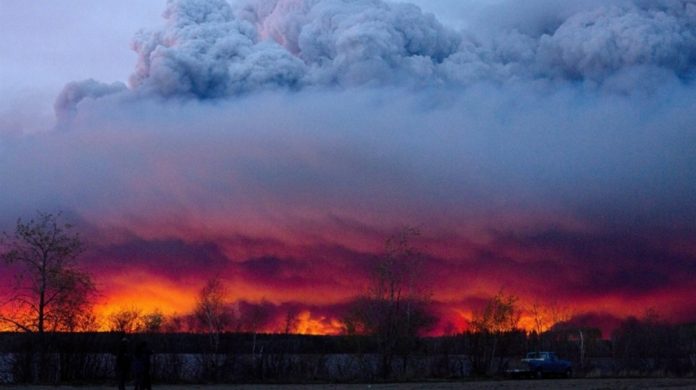
As night turned to day, and day into night again, the air in Fort McMurray, Alberta, remained thick with smoke. After a massive wildfire that has been raging since the weekend prompted a mandatory evacuation of the 80,000-resident Canadian city, the province of Alberta declared a state of emergency on Wednesday.
“It is a possibility that we may lose a large portion of the town,” Scott Long, an official with Alberta’s emergency management agency, told Reuters.
Following more than a day of frenzy along Highway 63, through which most residents fled, officials said they believe everyone made it out of Fort McMurray. The fire, sparked by a combination of unusually high temperatures and dry conditions in nearby boreal forests, had virtually split the city in two.
According to the Associated Press, while the majority of evacuees fled to the south through the highway, about 10,000 were moved north and lodged at oil sands work camps.
Arenas and hockey rinks also offered makeshift shelter, Reuters reported.
The fire has already devastated several neighborhoods, including one in which 80 percent of the homes were lost. An estimated 1,600 structures have been destroyed, Alberta Premier Rachel Notley said.
Lives have been lost in at least one vehicle collision, but it is unclear whether the fatalities were related to the fire.
Federal Public Safety Minister Ralph Goodale told the AP that the evacuation may be the largest in Canadian history – and the flames continue to beat on, alive and unrelenting.
Speaking of neighborhoods that have thus far been spared, Fort McMurray Fire Chief Darby Allen told the CBC: “This fire will look for them and it will find them, and it will try to take them. And our challenge today is to try to prevent that.”
As the fire moved toward Fort McMurray International Airport, all commercial flights were suspended.
Faced with an escalating disaster, residents valiantly left their burning homes behind.
“We had to literally drive through smoke and fire, vehicles littered all over the sides of the road,” Breanna Schmidt told the AP, “and we had to drive as fast as we could and breathe as little as we could because the smoke was so intense.”
Many knew it would be a while before they could come back. And when they do, it is uncertain whether there will be anything but ashes to greet them.
Dan Bickford escaped with his wife, two daughters, two dogs and a cat, the Globe and Mail reported. His neighborhood was in flames as he drove out, having packed the family’s worldly possessions in just a few bags.
“Our kids grew up in Beacon Hill, in our first house, and I just don’t know if it’s still there anymore,” Bickford told the Globe.
Displayed residents have been helped by hotel and motel owners in neighboring towns, where thousands of rooms have been offered to evacuees free of charge.
Fort McMurray rests in the heart of the Alberta oil sands, home to one of the largest proven crude oil reserves in the world. The nearby Athabasca oil sands are the largest single oil deposit in the world, containing an estimated 1.74 trillion barrels of bitumen.
Production has been reduced or suspended at many of the surrounding industrial plants. Sixty miles north of Fort McMurray, mining operations at Shell Albian Sands has been shut down; Suncor has reduced production at a facility 15 miles north of the city, the Globe reported.
Chelsie Klassen, a spokeswoman for the Canadian Association of Petroleum Producers, told the AP that 80 percent of the oil sands are located deep underground. They can burn under certain circumstances, she said, but do so at a much slower pace.

